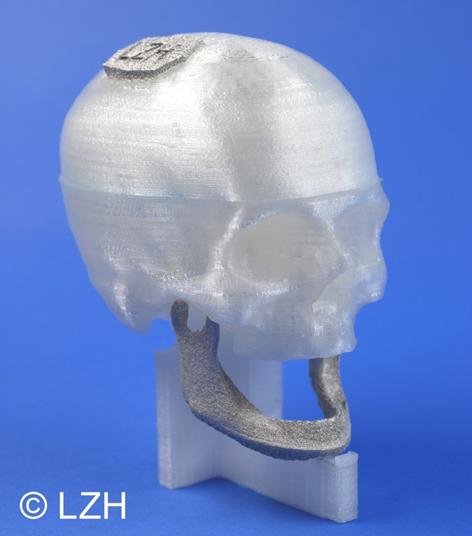LZH shows the potential of the laser for industrial manufacturing at the LASYS 2016

Individual magnesium implant, manufactured by optimized Selective Laser Melting Photo: LZH
Highly precise and highly flexible: Manufacturing micro structures, sensors and functional surfaces with the laser
Laser micro processing enables manufacturing processes for components that are not possible with conventional manufacturing techniques. Here, ultrashort pulse lasers with pulse durations in the pico- and femtosecond range are used to generate highly precise and durable structures in almost all solid materials.
Another advantage of this process, besides the flexibly usable lasers, is that thermal and mechanical damages are negligible. Thus, for example thin-film strain sensors for measuring forces and momentums can be applied directly on the component. In this way, picosecond lasers generate functional surfaces with variable geometries by laser structuring. An application field for these surfaces is gravure printing in organic electronics.
Cutting metals faster and more cost-efficient underwater
Underwater works are often time-consuming and physically very demanding for the divers. The LZH develops an automated laser-based cutting process that increases the cutting speed significantly. Currently, the main application is cutting sheet pilings. But this laser-based process is also suited for repairing offshore-facilities and ships, as well as for dismantling nuclear power plants or for underwater mining.
Additive manufacturing using Selective Laser Melting and laser deposition welding
With Selective Laser Melting (SLM) it is possible to create smallest three-dimensional structures, complex parts or individual implants virtually “out of nothing”. The LZH develops processes for the additive manufacturing of load-adapted parts and for the processing of special materials, such as magnesium.
With Selective Laser Micro Melting (SLµM) it is thus also possible to manufacture parts with resolutions up to <30 µm. When high-quality machine parts are damaged, they can in many cases be repaired by Laser Metal Deposition welding (LMD). Moreover, adding layers by LMD can protect three-dimensional surfaces from wear and corrosion.
Further education seminar „Additive Manufacturing Specialist“
The LZH Laser Akademie GmbH, one of the leading further education centers in applied laser technology, together with the Schweißtechnische Lehr- und Versuchsanstalt (SLV) Hannover is nationwide the first to offer a new certified further education seminar “Additive Manufacturing Specialist”. In this five-day course, skilled workers, master craftsmen and technicians learn how to operate systems for Selective Laser Melting.
Media Contact
More Information:
http://www.lzh.de/All latest news from the category: Trade Fair News
Newest articles

First-of-its-kind study uses remote sensing to monitor plastic debris in rivers and lakes
Remote sensing creates a cost-effective solution to monitoring plastic pollution. A first-of-its-kind study from researchers at the University of Minnesota Twin Cities shows how remote sensing can help monitor and…

Laser-based artificial neuron mimics nerve cell functions at lightning speed
With a processing speed a billion times faster than nature, chip-based laser neuron could help advance AI tasks such as pattern recognition and sequence prediction. Researchers have developed a laser-based…

Optimising the processing of plastic waste
Just one look in the yellow bin reveals a colourful jumble of different types of plastic. However, the purer and more uniform plastic waste is, the easier it is to…



